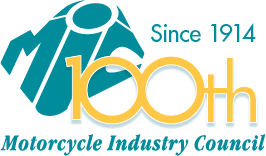SAE INTERNATIONAL ADOPTS TEST BASED ON MIC PROTOCOL FOR DETERMINING ELECTRIC MOTORCYCLE TOP SPEED
Standardized Method Can Benefit Consumers
IRVINE, Calif., Mar. 03, 2014 – SAE International, recognized worldwide for developing motor vehicle standards, has adopted a new top speed test based on the protocol developed by the Motorcycle Industry Council’s Electric Vehicle Subcommittee.
Prior to the development of this standardized test procedure, electric motorcycle manufacturers used different methods to calculate top speed, which presented a challenge for consumers interested in comparing various electric motorcycles.
“With several brands of electric motorcycles on the market, having standardized testing protocol is vital,” said Abe Askenazi, chair of the MIC’s Electric Vehicle Subcommittee and chief technology officer at Zero Motorcycles. “It allows manufacturers to be able to present consistent information to consumers for product comparison. The MIC’s Electric Vehicle Subcommittee is honored that SAE has chosen to adopt our key recommendations.”
SAE J3007, Recommended Practice, Top Speed Test Procedure for Electric Motorcycles, is based on the European Union test procedure and sets standards for the many variables involved in determining top speed, such as vehicle equipment, battery charge-discharge cycle, test roadway conditions, and the rider’s weight, attire and riding position. Additionally, it considers atmospheric conditions, such as wind speed, temperature and atmospheric pressure.
The MIC’s Electric Vehicle Subcommittee includes representatives of on-highway electric motorcycle makers who currently market or are developing electric motorcycles, as well as other industry participants. In addition to developing test procedures for the top speed and riding range, the subcommittee addresses a broad scope of issues related to electric vehicles, including public information/education and government legislation.
SAE J3007 can be purchased from SAE at: standards.sae.org/j3007_201402/.
The Motorcycle Industry Council exists to preserve, protect and promote motorcycling through government relations, communications and media relations, statistics and research, aftermarket programs, development of data communications standards, and activities surrounding technical and regulatory issues. As a not-for-profit, national industry association, the MIC seeks to support motorcyclists by representing manufacturers, distributors, dealers and retailers of motorcycles, scooters, ATVs, ROVs, motorcycle/ATV/ROV parts, accessories and related goods and services, and members of allied trades such as insurance, finance and investment companies, media companies and consultants.
The MIC is headquartered in Irvine, Calif., with a government relations office in metropolitan Washington, D.C. First called the MIC in 1970, the organization has been in operation since 1914. Visit the MIC at www.mic.org.

